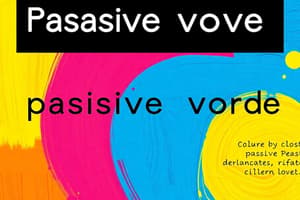Podcast
Questions and Answers
Which of the following sentences demonstrates the use of the present simple tense for a habitual action?
Which of the following sentences demonstrates the use of the present simple tense for a habitual action?
- She reads every morning. (correct)
- They are playing soccer at the moment.
- I am visiting my grandmother now.
- He is studying for his exams.
What is the correct negative form of the present simple tense for 'He plays.'?
What is the correct negative form of the present simple tense for 'He plays.'?
- He plays not.
- He does not play. (correct)
- He is not playing.
- He do not plays.
Which sentence is an example of present continuous used for a future arrangement?
Which sentence is an example of present continuous used for a future arrangement?
- He is living here since last month.
- She plays the piano beautifully.
- I study hard every day.
- We are meeting them tomorrow. (correct)
Identify the sentence that uses an incorrect time expression with present continuous.
Identify the sentence that uses an incorrect time expression with present continuous.
Which of the following reduces ambiguity about subject-verb agreement in the present simple tense?
Which of the following reduces ambiguity about subject-verb agreement in the present simple tense?
What is the correct interrogative form of 'You are playing.' in present continuous?
What is the correct interrogative form of 'You are playing.' in present continuous?
Which sentence correctly uses the present simple tense?
Which sentence correctly uses the present simple tense?
What common error is demonstrated in the sentence 'I am knowing the solution'?
What common error is demonstrated in the sentence 'I am knowing the solution'?
How does present simple differ from present continuous?
How does present simple differ from present continuous?
Which of the following sentences is in the correct negative form of the present continuous?
Which of the following sentences is in the correct negative form of the present continuous?
Flashcards are hidden until you start studying
Study Notes
Present Simple and Present Continuous Study Notes
Usage Rules
-
Present Simple:
- Used for habitual actions: "She reads every morning."
- Used for general truths: "Water freezes at 0°C."
- Used for scheduled events: "The train leaves at 6 PM."
-
Present Continuous:
- Used for actions happening now: "I am studying."
- Used for temporary situations: "He is living in London for a month."
- Used for future arrangements: "We are meeting them tomorrow."
Form And Structure
-
Present Simple:
- Affirmative: Subject + base form of the verb (add 's' or 'es' for third person singular)
- Example: "She plays."
- Negative: Subject + do/does + not + base form of the verb
- Example: "He does not play."
- Interrogative: Do/Does + subject + base form of the verb?
- Example: "Do you play?"
- Affirmative: Subject + base form of the verb (add 's' or 'es' for third person singular)
-
Present Continuous:
- Affirmative: Subject + am/is/are + verb + -ing
- Example: "They are playing."
- Negative: Subject + am/is/are + not + verb + -ing
- Example: "She is not playing."
- Interrogative: Am/Is/Are + subject + verb + -ing?
- Example: "Are you playing?"
- Affirmative: Subject + am/is/are + verb + -ing
Time Expressions
-
Present Simple:
- Often used with: always, usually, often, sometimes, rarely, never, every day/week/month/year.
-
Present Continuous:
- Often used with: now, right now, at the moment, currently, today.
Common Errors
-
Present Simple:
- Incorrect subject-verb agreement: "He go to school." (Correct: "He goes to school.")
-
Present Continuous:
- Using stative verbs incorrectly: "I am knowing the answer." (Correct: "I know the answer.")
-
Confusing time expressions: Using a time expression for present simple with present continuous.
Comparison Of Tenses
- Present Simple vs. Present Continuous:
- Present Simple indicates routine or facts; Present Continuous emphasizes ongoing actions.
- Present Simple is more permanent; Present Continuous is often temporary.
- Example:
- Present Simple: "I read books." (habit)
- Present Continuous: "I am reading a book." (currently happening)
Usage Rules
- Present Simple expresses habitual actions, general truths, and scheduled events.
- Present Continuous describes actions currently taking place, temporary situations, and future plans.
Form and Structure
- Present Simple follows:
- Affirmative: Subject + base form (adds 's'/'es' for third person).
- Negative: Subject + do/does + not + base form.
- Interrogative: Do/Does + subject + base form?
- Present Continuous follows:
- Affirmative: Subject + am/is/are + verb + -ing.
- Negative: Subject + am/is/are + not + verb + -ing.
- Interrogative: Am/Is/Are + subject + verb + -ing?
Time Expressions
- Present Simple frequently pairs with: always, usually, often, sometimes, rarely, never, and every day/week/month/year.
- Present Continuous often is used with: now, right now, at the moment, currently, today.
Common Errors
- Present Simple mistakes include incorrect subject-verb agreement, e.g., "He go to school" should be "He goes to school."
- Present Continuous mistakes involve misusing stative verbs, e.g., "I am knowing" should be "I know."
- Confusion between time expressions for Present Simple and Present Continuous can lead to errors.
Comparison of Tenses
- Present Simple indicates routines, facts, and is typically seen as permanent.
- Present Continuous highlights ongoing actions, often viewed as temporary.
- Example distinction:
- Present Simple: "I read books." (habitual action)
- Present Continuous: "I am reading a book." (action in progress)
Studying That Suits You
Use AI to generate personalized quizzes and flashcards to suit your learning preferences.




